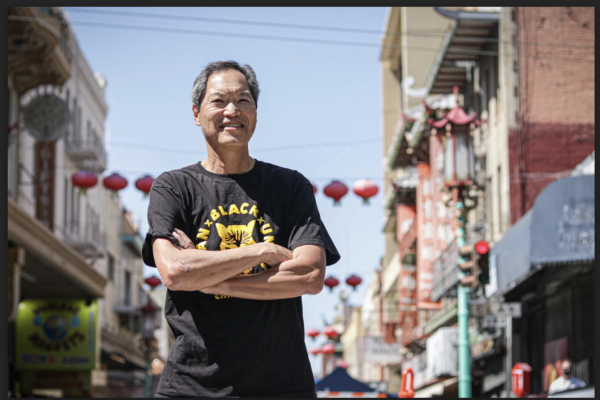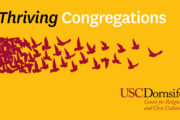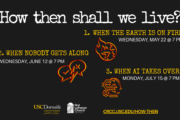This radio documentary was originally produced by KALW’s The Spiritual Edge, with the support of CRCC’s global project on engaged spirituality.
To hear this and other profiles, subscribe to The Spiritual Edge podcast in your favorite podcasting app, including Apple podcasts, Spotify or Google Podcasts. Find out more on The Spiritual Edge website.
Along with everything else he does, Russell Jeung is a runner. He has logged nearly 1600 miles this past year on trails near his home in Oakland California. Sometimes, his routine includes what he calls “breath prayers.”
“So that’s breathing in and out. I would take two strides and say something like ‘God sees me.’ And then I can think: ‘God hears me.’ ‘God holds me.”
Then he checks his time to see how fast he’s running: “If I’m doing well, I’ll try to beat a previous running time.”
Running is one way Russell Jeung decompresses from his work as an academic and an activist.
His wife Joan also runs, and early in the COVID pandemic, he recalled this incident she faced on a running trail near their home in Oakland.
A man approached Joan Jeung on the narrow trail, blocking her path, and just as she was passing him, the man turned to cough on her face. As a pediatrician on the frontlines, Joan was worried. Soon, she and Russell realized that people were deliberately coughing and spitting on Asians at alarming rates across the country.
As a Professor in the Asian American Studies department at San Francisco State University — the school that pioneered and launched ethnic studies in the United States — Russell Jeung says he knew what was about to happen next.
“We knew from history that Asians get blamed for diseases,” Russell says, “Then people attack them with racist violence and with racist policies.”
So he reached out to colleagues Cynthia Choi and Manju Kulkarni, who both led Asian American nonprofits in California. Together, they launched Stop AAPI Hate — a website to report hate incidents and violence against Asian Americans. They track the location and frequency of these racially motivated incidents and propose policies and practical solutions to prevent these racist acts.
In its first week, the Stop AAPI Hate team fielded hundreds of messages like these:
I was in line at the pharmacy when a woman approached me and sprayed Lysol all over me. She was yelling out, “You’re the infection. Go home. We don’t want you here.” I was in shock and cried and left the building. No one came to my help. (Marietta, Georgia)
My elderly mother, 65 years old, was waiting for the subway. Someone tried to push her off the platform down into the train tracks. She screamed and a fellow bystander chased off the perpetrator. (Boston, MA)
Two white men, who live nearby, tried to hit us with their car. We jumped out of the way and they missed us by inches. They then stopped and yelled out of the window at us ‘Go back to China!’ (Beverly Hills, CA)
Three boys circled my friend, spat on her, and called her slurs, etc. She was about to burst into tears. She is scared to go to school now. (Amsterdam, NY)
The pandemic was killing hundreds of thousands of people. But the research Russell and his team collected through the Stop AAPI Hate site indicated that some Asian Americans felt more stress about the racism they were facing than they did about getting coronavirus.
“You could protect yourself against COVID-19 by wearing a mask,” Russell says, “But you can’t protect yourself from some random stranger who’s going to push you or spit on you, right? And that’s really anxiety-provoking.”
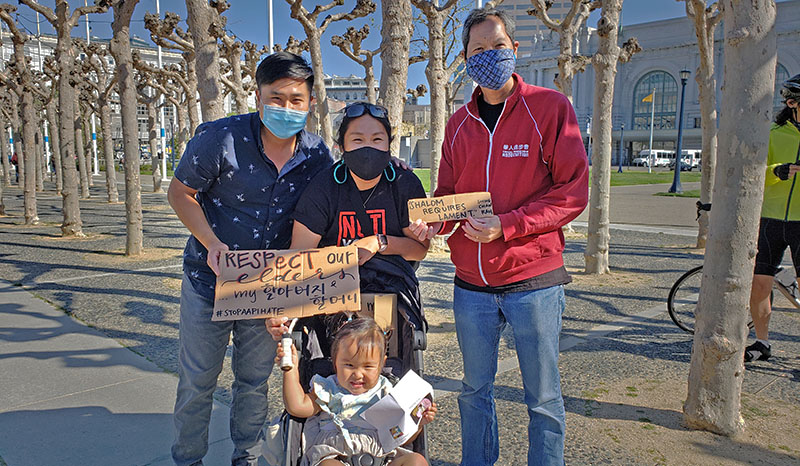 The Stop AAPI Hate team worked 14 to 16 hours a day, demanding big changes: funding for more mental health services and legal services for hate crime survivors; anti-bullying training for teachers; rewriting American textbooks to include Asian Americans in U.S. history; resources for public safety programs, such as civilian foot patrols to help seniors, and interpreters to navigate these resources.
The Stop AAPI Hate team worked 14 to 16 hours a day, demanding big changes: funding for more mental health services and legal services for hate crime survivors; anti-bullying training for teachers; rewriting American textbooks to include Asian Americans in U.S. history; resources for public safety programs, such as civilian foot patrols to help seniors, and interpreters to navigate these resources.
In California, where they already had allies, they started building coalitions as models for national expansion.
Anti-Asian violence was escalating, but the Stop AAPI Hate team suspected it wasn’t the worst.
“We strategized what would happen if there is a mass shooting, what would happen if there was mass detention, what would happen if there was more racial profiling,” Russell says. “And all those worst-case scenarios came to fruition.”
What the team anticipated— but hoped would not happen — did.
On March 16, 2021, a gunman in Atlanta Georgia killed six Asian American women.
In the Asian American community, people were in shock, grieving. Women, in particular, feared for their safety. We were calling our mothers, worrying about our daughters, telling them to be careful.
All this meant more work for the Stop AAPI Hate team. Organizing rallies and protests and prayer vigils. Russell found himself fielding non-stop calls from the press, from community partners.
“We had all the press call us that week. Right? And so in some ways I didn’t have any time to stop and think and reflect on the Atlanta shootings. Cause I was responding.”
He says that taking action helped him grieve.
“Even now we’re learning that, you know, with the trauma people have different responses, there’s depression and anxiety, but responding gives you a sense of control rather than a sense of hopelessness.”
He adds, “You have a sense of mastery rather than a sense of ‘there’s nothing we can do’ against all the societal racism against us. You need to translate your grief into action or else it just sits with you. It burns into you. It becomes resentment and fear. It paralyzes you.“
Russell and his team doubled down on their efforts to meet with lawmakers, educators, and neighborhood leaders.
They also started this hashtag: #StopAAPIHate. After the shootings in Atlanta, it went viral. Daniel Dae Kim, Eric Nam, Bowen Yang, Sandra Oh, Jeremy Lin, and other celebrities, they took to their social media feeds with the hashtag.
“I knew we made it as a global movement when BTS tweeted at us and it became like the leading hashtag,” he says. “And so, um, thank you BTS.”
BTS, the breakout South Korean boy band with dedicated K-pop fans all around the world. For the record, Russell did already know who BTS was.
Corporations, like the 99 Ranch supermarket chain, McDonald’s, Disney and others, started tugging on Russell’s sleeves, too. They booked him to speak at their companies, asking for advice about anti-racist policies in the workplace. And how to harness the influence of their brands for change.
“Everybody wants something right away,” Russell says. “And so I’m sitting with Disney executives and I’m thinking, wow, you know what? We know that in terms of fighting racism, if changing the narrative is part of the solution, maybe spending time with Disney executives is actually more strategic than talking to the White House.”
The Stop AAPI Hate team barreled ahead, responding to calls for advice and media requests — and they continued their research. Over the course of a year they released nearly two dozen reports.
Reports about what was happening all over the country: in places like Atlanta, L.A., Texas. Asian American youth being bullied, the violence against Asian American women and girls, and most recently, a report about mental health.
Their data showed how common it is for Asian American survivors of racial incidents to show symptoms of trauma. People continued to share their experiences with Russell and his team.
“Someone drove up to me, rolled down their window, shouted “I used to beat up your kind of people when I was in high school!” I was terrified. I was alone, I was just going to pick up dinner, I cried hysterically in my car after the incident.”
“I was walking with a female friend, and a man walked past us and said “Chinese go back to China.” He repeatedly yelled at us “Go back to China.” We were very scared and tried to get away from him but he followed us for about three minutes, one block. My friend and I were shaken.” (Annadale, DC)
“We have been terrorized by a (neighbor) yelling, shouting, and spitting at our elderly mother, when she is in her yard. We feel afraid for our safety. We are on edge, constantly fear intrusion into our home, cannot sleep well at night, unable to walk outside due to fear for our safety.” (Villa Park, CA)
Russell explains how these traumas affect mental health, “Hypervigilance is now you’re super aware of your surroundings. You’re concerned about, other people, strangers. I know people walking down the sidewalk and they would, if someone came running at them, they would jump into traffic because they’re more afraid of the person than the traffic. Right. That’s hypervigilance.”
And that’s not all. Other symptoms emerge too.
“What we found is that anger increases over time as more people reflect on what happened to them, they realize that was really wrong. That type of mistreatment, that was really unfair.”
Russell wasn’t immune to this kind of trauma either.
He gets choked up saying, “Yeah. Now that I think about Atlanta, man, I’m still really upset. Um, at least I have a heart still, right? I’m glad I could still be moved. Right. Rather than. These just being names or numbers, you know?”
His wife Joan concurs, “He cries more. He’s not one to cry and I’ve seen him cry definitely more often than before. And he talks about the emotional load that he’s carrying and how hard this is and how hard this might be to sustain over the long-term.”
Russell sees his emotions as a gift, though, not a burden, “I am grateful, yeah. That, that I get to grieve with others and that I get to still be, um, to feel the pain because, you know, otherwise I’ll just become this dead-end heartless angry person. And so I’d rather be a grieving pain, yeah, person than an angry hardened person.”
Russell’s seeing a therapist, who’s helping him deal with his grief and other issues.
“Yeah. So I have, like people say there’s multiple sides and if you hang around me, you know, there’s grumpy, cranky, critical Russell, right?”
“That’s like, if you watch the movie ‘Up,’ there’s that grumpy old guy. And I could see myself growing into that grumpy old guy. Um, because I just like could point out flaws and everything
And then, if we’re in a business mode, I’m sorta, type A, efficient, be clear, let’s get to the point demanding.”
When asked if he thinks those descriptions of being impatient or critical are strengths to help get things done he agrees.
“Yeah. Yeah, they do. I know they are. Yeah. I pushed through, I see the possibilities, I want to make change. That’s why I could crank out reports. That’s why I could write books really quickly and easily. It’s just ‘cause, like, I don’t care what other people think. I just want to get it done.”
“And so I, I get things done.”
There’s no doubt about that. Long before the Stop AAPI Hate campaign, Russell and his wife Joan have been activists in their Oakland, California neighborhood. He’s organized his neighbors, mostly Latino and Cambodian, to sue their slumlords over crummy living conditions. They won. He’s friends with the families living in tents under the freeway because the rent’s gotten too high. He brings them supplies.
Russell believes that God gave him the heart to make all these things happen. And that’s why he believes that something that’s as big as racism, that it’ll be God who changes that, too.
He explains, “I am not so worried about the hashtag movement, I want to make sure my next-door neighbor, the Vietnamese grandfather, is safe on the streets and I see him and he reminds me that this is what I’m working for to keep him safe.”
But there was this time a few months ago, he’d promised to help an elderly neighbor with something. He was so busy with the Stop AAPI Hate campaign that he forgot.
“I actually, I felt so bad. I forgot someone’s grandma. It still bugs me. The grandma that I forgot kept me grounded.”
Russell says that spending time with his wife and his kids, keeping a journal, his dry sense of humor, and his faith, are the things that help sustain him.
Joan says prayer plays a part too.
“We pray together as a family and so we pray together every night,” Joan says. “And so that’s just been a family tradition. We attend church together. Like group worship has been an important piece of fueling the work that we do. Even many years of doing activism in Oakland and doing organizing work in Oakland and seeing what happens, there are some wins and there are many losses and there are tragedies, things that caused us a lot of grief through the years.
And it helps Russell and Joan to find meaning in their activism and their work. To see a bigger purpose in what they’re doing.
“I’m just part of the movement overall,” Russell says. “And I’m just part of God’s plan and the big, big picture and the cosmic picture. And that if I’m led by God, then I, you know, what better place can be to be in the center of God’s will.”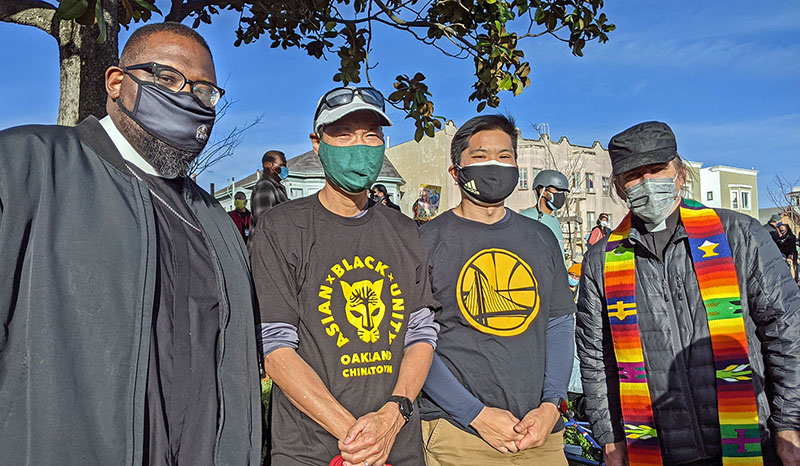
In the process, Russell and his wife, Joan have seen big changes as activists. Things that seemed impossible.
“Even though we have seen shootings and death and pain and violence, you know, societal oppression, that’s been, you know, centuries-old there, we could still see change.”
He wants people to understand why racially motivated crimes happen. To know what it feels like to face this kind of trauma and to survive it. So that maybe the next time you’re a bystander, you’ll choose to intervene. Or maybe the people who commit these crimes, they’ll develop a little more empathy, too.
Russell also believes in restorative justice. Russell doesn’t believe sending people to prison is the solution. He wants us to understand what’s causing people to commit these hate crimes.
“Rather than incarcerating people or punishing people, what we try to do is empathize with people, understand why they caused harm, understand how harm has impacted others, and then see the humanity in each other. To prevent the harm from occurring again.”
“I think we need to have empathy for one another in order to stop the cycle of racism or violence. And all this will take time, of course.”
In the meantime, Russell plans to keep going with the Stop AAPI Hate Campaign, for however long that it takes. In a state with a significant Asian American community, the team has scored a legislative win. In July 2021, state lawmakers in California approved a historic $156 million API Equity Budget. For services for hate crime survivors, interpreters. Health care and counseling, restorative justice programs in schools, and more.
And Russell and Joan, they plan to keep on running.
“Yeah, I gotta keep on running as long as I can,” Russell says. “I thought about this. I want to run a marathon in my sixties. I think that sounds sort of cool.”
In other words, nothing’s gonna stop him.
Photos by Myleen Hollero.
Heidi Shin is a journalist fellow with the Spiritual Exemplars Project.
